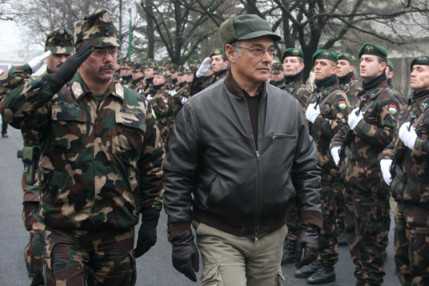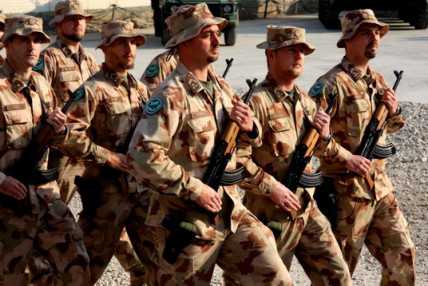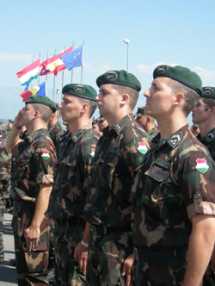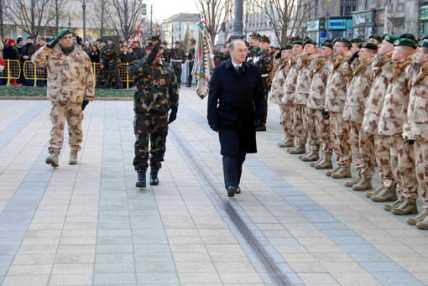“The Defence Forces Are Worthy Of The Trust Of Society”
Szöveg: Ádám Draveczki | 2009. március 4. 9:22In 2009, the Hungarian Defence Forces will continue to act in the spirit of permanence but due to the impacts of the global economic crisis certain changes will also be introduced. Minister of Defence Imre Szekeres has spoken about the above and many other current issues in detail in his interview given to honvedelem.hu.
Minister, recently you have held your annual review and tasking meeting under unusual circumstances. How did you describe 2008 in the life of the Hungarian Defence Forces? Which were the most important achievements, developments?
Truly, this year’s annual review and tasking meeting was held not under the usual Budapest circumstances but in Tata, and the reason for this was that instead of listening to presentations, the invitees – the leaders of the ministry and the defence forces, moreover the representatives of the press – could check in practice that the armed forces are prepared. In my speech evaluating last year’s results, I have said that there is a successful and busy year behind us. There were some extraordinary events which have made the Hungarian Defence Forces important for the entire Hungarian society. We commemorated our illustrious anniversaries honourably; celebrated the 160th birthday of the Hungarian Defence Forces and the 70th birthday of the Air Force with successful events attracting huge crowds. I am proud that we have completed, and the government has adopted the National Military Strategy, in which we have identified the military tasks of safeguarding security and the directions of military development. Having elaborated the strategy, we have made up for a deficiency that had been around for long, because since the change of the political system we have not had an up-to-date military strategy. The new strategy takes it as its starting point that there is no military threat in the traditional sense imperilling our country; the majority of the neighbouring countries are either NATO and EU members or want to join these alliances. This increases the security of the entire region. At the same time, there are new types of security risks, such as terrorism or the danger of industrial and natural disasters. The National Military Strategy responds to these challenges as well. In 2008, we have also launched the exemplary model of multinational cooperation, the Strategic Airlift Capability (SAC). The C-17 strategic airlift fleet maintained jointly by certain NATO and EU member states will be stationing at the Pápa Base Airport. With this, our country undertakes an important part from the tasks we all share.

To what extent does the global economic crisis influence the targets you have set? As it is already known, the government is freezing HUF 60 billion from the budget of the ministries. Of this amount, how much is the share of the Ministry of Defence? In which areas is it possible to make savings?
On Tuesday, in the framework of the press conference of the spokesperson of the government, I presented the measures we have introduced for the sake of economization. From the total frozen amount, HUF 7 billion is the share of the Ministry of Defence, this is how much we have to save. As the minister of defence, I make every effort to manage our operations efficiently and economically with the 313 billion forints which will be available to us eventually. We provide for the conditions of the three main responsibilities of the Hungarian Defence Forces: the military defence of the country and disaster prevention, furthermore cooperation with the allies. We guarantee the technical requirements and the necessary staff numbers. Moreover, we also offer employment: we are able to employ 3 000 contracted soldiers all over the country, making up for the job opportunities that are ceasing to exist as a result of the economic recession. With this step the defence forces can prove that they are worthy of the trust of society, and create predictable, stable employment opportunities. On the other hand, there is a real need for economical operations. This is why we are deleting those tasks planned for 2009 which do not have a direct effect on the successful completion of the main sets of tasks. For instance this year we will not organize our traditional big events serving to strengthen the social relations of national defence – the May Day Parade of the Defence Forces, the Evening Party of National Defence, the International Air Show and Military Display, and the International Festival of Honour Guards and Military Bands. The 426 million forints saved as a result of this will be spent on training, recruitment, and job creation. Military honours will be provided only in case of national events, saving us approximately 125 million forints. A further measure is that we will radically – by 20 percent – decrease the number of meetings, consultations, conferences, trainings, field trips planned in the framework of bi- and multilateral relations. I am also initiating that we can hand over some 70 pieces of properties – currently under the asset management of MoD – which have been declared unnecessary, and other properties which have also been declared unnecessary and constitute a part of the National Land Fund, to the Hungarian State Holding Company immediately. With this step, a further 1.2 billion forints can be saved, as regards maintenance and guarding/security costs.
Staying with this topic: what effects could the difficulties of global economy have on NATO operations, with special regard to the Afghanistan mission of the alliance?
They do have an effect on them, and NATO member states and other countries participating in peacekeeping in Afghanistan are also expected to make bigger sacrifices. Nevertheless, peaceful development in Afghanistan is in our political and economic interest. Regarding peaceful development, this year can be a turning point since in the summer elections will be held in the country. If the local and national administration elected as a result of that will be supported by the Afghan nation, that may pave the road to internal reconciliation. At last week’s NATO defence ministerial conference held in Krakow I have announced that we, too, wish to contribute to the activity of the Elections Assistance Force. We are sending an infantry platoon from the NATO Response Force unit to the region. By the way, prior to the decision of the government, a five-party arbitration had been initiated. Nevertheless, the successful stabilization of Afghanistan is not only a military task; military means alone are not enough to reconcile the situation. The joint effort of the international community, development assistance based on wider grounds are necessary. A good example of that is the activity of our Baghlan Provincial Reconstruction Team (PRT). Returning to economic hardships, I believe it is important to mention that the current situation has an effect not only on the operations of NATO but on the organizational and financing issues of the alliance as well. We have also discussed these issues in Krakow. Such an issue is the future of the NATO Response Force (NRF). The NATO has to have a rapidly responding, powerful, coherent multinational NRF both as a deterrent and a deployable force. One that is flexible, cost efficient, sustainable, and at the same time tailored to operational tasks. At the defence ministerial conference I have suggested that we should apply joint financing in case of the forces to be deployed in the NRF. This is more fair than bearing the costs by those states that happen to take part in NRF in the given half-year. The other important organizational-financing issue is the reform of the NATO Headquarters. As regards this, I fully support Secretary General Mr Jaap de Hoop Scheffer’s intention to reduce, and increase efficiency. The effort aiming at improving cooperation between the various units and directorates of the Headquarters is also important. In the course of the organizational reform, we must achieve that along the decision-making processes the road leading to consensus is fast, for this improves efficiency and spares costs.

The mandate of Hungarian troops will terminate in March at the Kabul airport. In December, you visited them too in Afghanistan. What were your main impressions on the spot? To what extent has this task strengthened the prestige of Hungary within the allied system?
To a great extent. The control of the Kabul military airport demands a great technical, coordination, and military performance from us. Beyond the complicated organizational and technical elements of the task, there is also a considerable risk. We cannot exclude the possibility of an attack, but today in Afghanistan the airport is the most heavily protected facility. As regards the other areas of our commitment in Afghanistan, in line with the NATO concept we have laid emphasis on the training of Afghan corps. It is essential to train Afghan military corps since we would like the Afghan army and police to take over the safeguarding of security sooner or later. In order to achieve that, a Hungarian OMLT started its operations in Baghlan province, where the Hungarian PRT is stationed. The fact that in the past two-three years our country has always fulfilled what it had undertaken from common NATO tasks, has noticeably improved our international prestige. There are a number of signs of that, the most spectacular being that the Pápa Base Airport will accommodate the C-17 fleet. We would not have ’won’ this project without the extraordinary performance of Hungarian troops in peacekeeping.

In Kosovo, we have also undertaken a significant task by stationing a manoeuvre battalion there. It is the first time a military corps of ours participates in such a responsible operation, and what is more, this operation takes place so close to us, therefore it has a direct effect on the security of Hungary. We have been participating in the KFOR mission since the beginning, that is 1999, but this is the first task we are completing as the leading nation. The most important achievement is that in spite of occasional tensions we have managed to preserve the stability of the region, and slowly, but at the same time firmly, political consolidation also proceeds. However, the key learning is that there is still a need for the presence of international forces in Kosovo. It is important that the European Union should also have a more decisive role in Kosovo, since a long term and lasting solution can only be reached under the aegis of the EU.
In addition to Afghanistan and Kosovo, what other important tasks will the troops serving in other Hungarian peacekeeping units abroad have?
We will probably face new challenges in Bosnia. So far the European Union has not made an official decision, but according to the plans peacekeeping would be replaced by consultancy and training activities. The Hungarian Defence Forces are ready to participate in this, too, for the stability of the Balkans is in our fundamental national interest. We are still present in Cyprus as UN peacekeepers, which is one of our most considerable international commitments.
Hungary supports the NATO accession of the Ukraine. As it has been revealed by the gas crisis as well, the Russian-Ukrainian relations are very vulnerable. What would the greatest benefits of the Ukrainian NATO membership be, and what else must be clarified by any means in this field? In which directions might the alliance enlarge its membership in the foreseeable future?
We support the Euro-Atlantic integration of the Ukraine, provided they meet the requirements. It is important that NATO maintains the ‘open doors’ policy, and it is also important that candidate countries prepare for membership. The duration of the process depends on their progress. The preparation of our country lasted nine years. In the case of the Ukraine, I deem it is an important problem that for the time being, the majority of voters do not support the accession of the country to NATO. As regards our southern neighbours and the nearby countries, we are absolutely committed to the accession of Croatia, Albania, and Macedonia. The decision has already been made on the accession of the former two countries, therefore I hope that this April, at the next NATO summit, these countries will participate as member states. The accession of Macedonia depends only on the success of diplomatic efforts, namely that an agreement can be reached with the Greeks, since the debate is only about the name ‘Macedonia’. I can imagine that in due course, Montenegro, Bosnia and Herzegovina, and also Serbia will submit their application for accession.

To what extent do you think the American military policy will change by the inauguration of Barack Obama in the fields where Hungary is directly involved?
The cornerstone of European security is the collective defence alliance. NATO is an alliance based on common interests and values, therefore consecutive governments do not influence the targets of the alliance which have been set together, but they do influence the accomplishment of these targets. The same stands for other global problems. The new administration led by President Obama is just as committed to the stabilization of Afghanistan for instance, and is ready to increase American efforts and raise the staff numbers of American troops.
Having discussed the issues of foreign policy, let us return to our domestic topics: the realization of the Pápa C-17 project is one of the success stories of the past few years. In which phase are the preparations now? How does all this influence the lives of the citizens?
The economic crisis will force NATO member states to an ever-growing extent to exploit the possibilities of multinational cooperation, since this is the efficient solution. Hungary actively participates in such initiatives. An exemplary model of multinational cooperation is the Strategic Airlift Capability (SAC), in the scope of which a jointly maintained C-17 strategic airlift fleet will be stationing at the Pápa Base Airport. This is the first considerable NATO initiative to which we provide a headquarters. The participating ten NATO member states and the two partner states – Sweden and Finland – have agreed to fund the investment and operational costs of the common C-17 fleet in proportion to utilization. The flight time and transport capacity we require make up slightly less than two percent of the total capacity – therefore we cover the expenses in the same ratio. This is less than two billion forints. If we had to deal with the transport tasks ourselves, it would cost fourteen times more even on a weaker technical level. We are reconstructing the Pápa Base Airport to meet the requirements. By the end of March, the new international corps, the Heavy Airlift Wing (HAW) will be set up. The crew operating and serving the C-17 fleet – some 220-230 persons – will settle around Pápa for decades, and this may create 300-500 job opportunities in the area according to the estimations, which will also be beneficial to the economy of the region.
Finally, let us mention another – hopefully successful – project as well: the preparations for the establishment, operations of the Veszprém-based NATO Logistics Centre of Excellence. What is the main aim of setting up the Centre, what is the significance of this initiative? How do these centres operate abroad?
The key target of NATO Centres of Excellence is to improve the cooperation among member states and the development of common capabilities. The operational profile of centres of excellence accredited so far shows quite a varied picture, however, one thing in common is that each of them have the most up-to-date knowledge at their disposal in their specific fields. The Veszprém NATO Logistics Centre of Excellence will be born from Pannon University, the Ministry of Defence, and other ministries joining forces. Its establishment is an integral part of efforts aimed at the development of Hungarian national economy and of the National Logistics Strategy, in other words of the target that Hungary became one of the logistic service centres of Central Europe. I hope this can be a point of emergence for Hungary, to which we can also contribute with our means.